Government ministers have warned the move will further worsen the country's COVID-19 situation and might cause the struggling health system to collapse.
The Czech parliament has voted against extending the country's COVID-related state of emergency.
The minority government of Prime Minister Andrej Babiš had urged MPs to back the vote in an attempt to stem the outbreak of coronavirus infections.
The state of emergency gives the Czech cabinet the powers to impose strict nationwide measures and limit people's rights during the health crisis.
But the lower house of the Czech Parliament refused the government's request to extend the measure beyond Sunday.
Just 48 MPs out of 106 present voted to support the extension, which also authorises the government to deploy the army and firemen or to keep most businesses closed.
Ministers have warned the move will further worsen the situation and might cause the struggling health system to collapse.
"We are going to go down in history as a country that demobilised in the middle of a war," Interior Minister Jan Hamacek told parliamentarians on Thursday.
Health Minister Jan Blatny also warned that the epidemic situation would worsen in less than two weeks and hit the country's already overcrowded hospitals hard.
But opposition parties have argued that the lockdown has not limited the spread of the virus, and have accused the government of not doing enough to support businesses affected by the restrictions.
The vote means bars, restaurants and cafes can possibly reopen on Monday while the night-time curfew and a ban on gatherings of more than two people will be cancelled.
The current state of emergency was brought in on 30 September, and the Czech government will need to use other legal options some restrictions, such as on individual regions.
"We will immediately apply all those remaining options we have," said Blatny, "[but] they're not as effective".
The country has had one million confirmed cases and 18,000 deaths since the start of the pandemic, while the number of new cases daily has recently reached 10,000.
Authorities in neighbouring Germany have closed borders with the Czech Republic and the Austrian region of Tyrol, over the spread of highly contagious variants of the coronavirus.
Meanwhile, on Friday, almost 600 Czech police officers were deployed to enforce a complete lockdown of the three hardest-hit border districts Cheb, Sokolov, and Trutnov.
A poll released on Wednesday highlighted widespread scepticism in the country about the pandemic, with less than half of Czechs saying they would stay home if they had symptoms of COVID-19.
